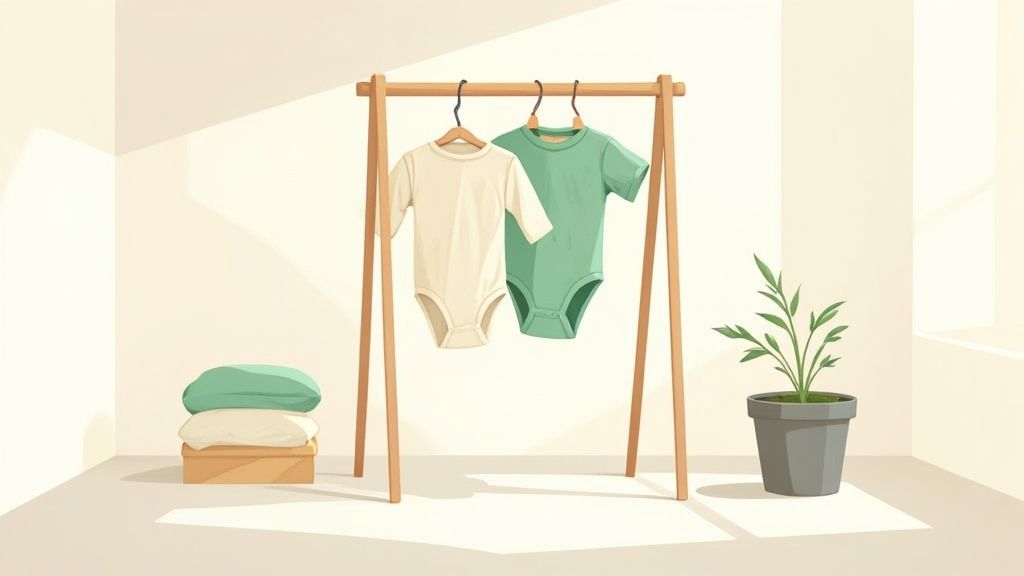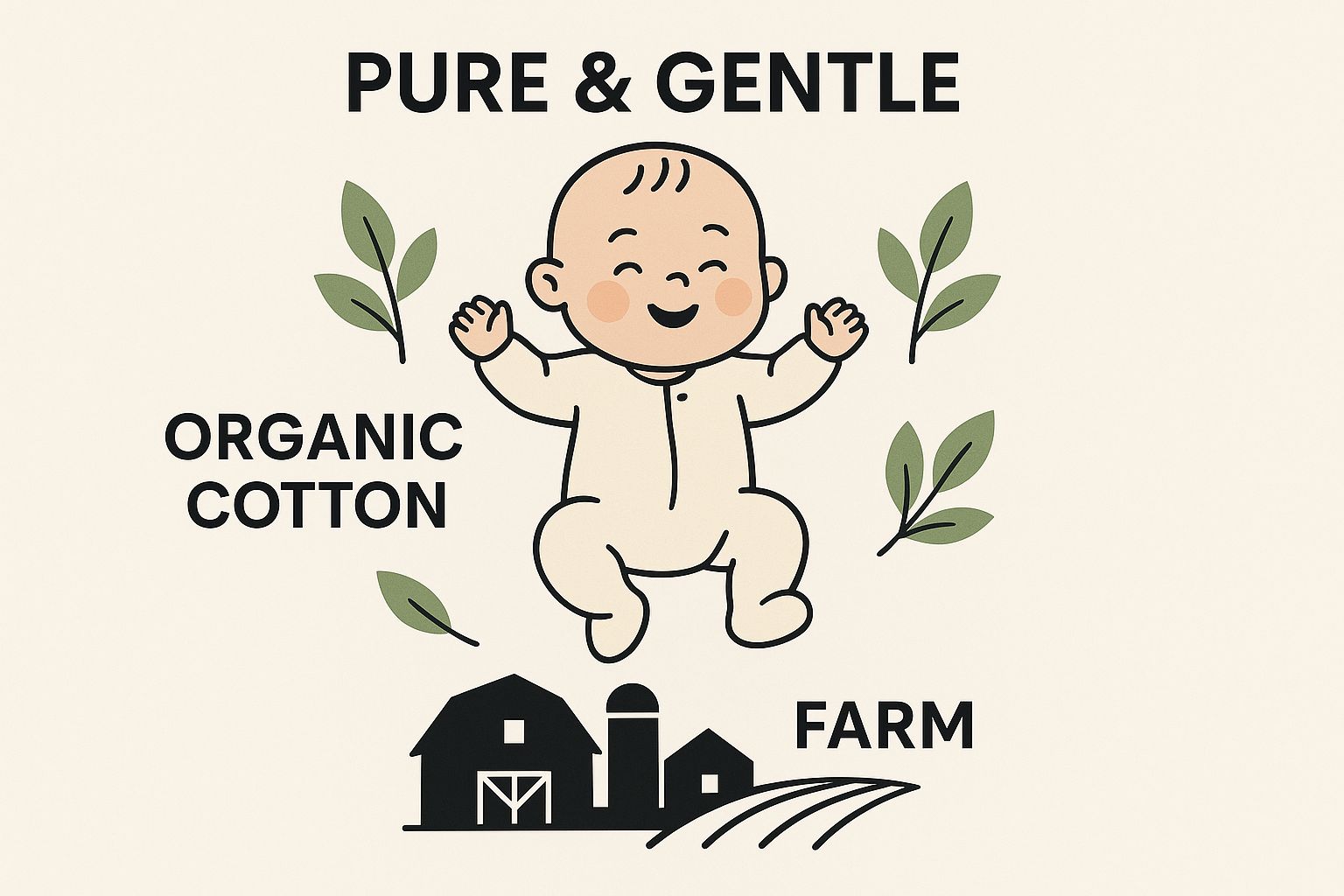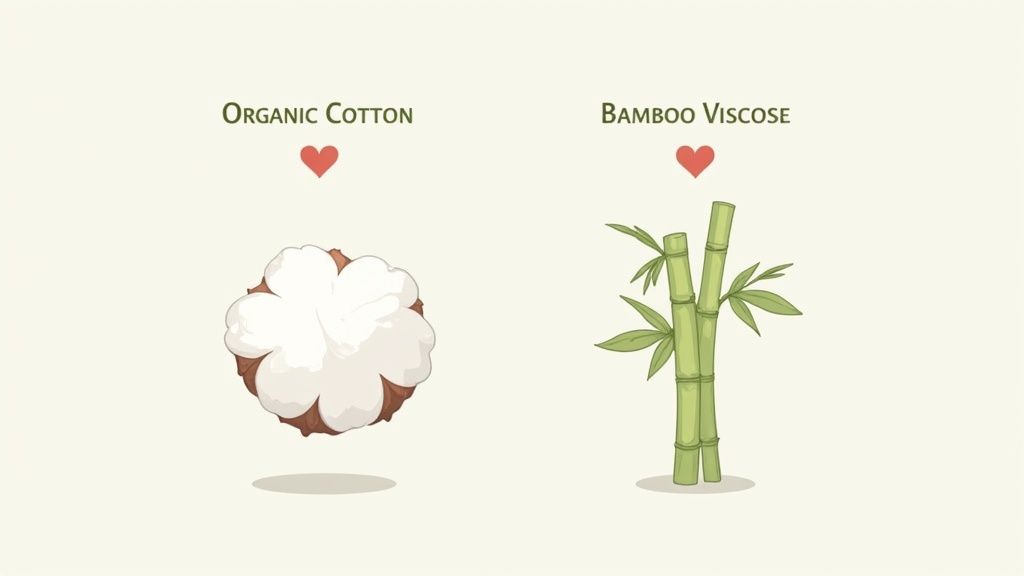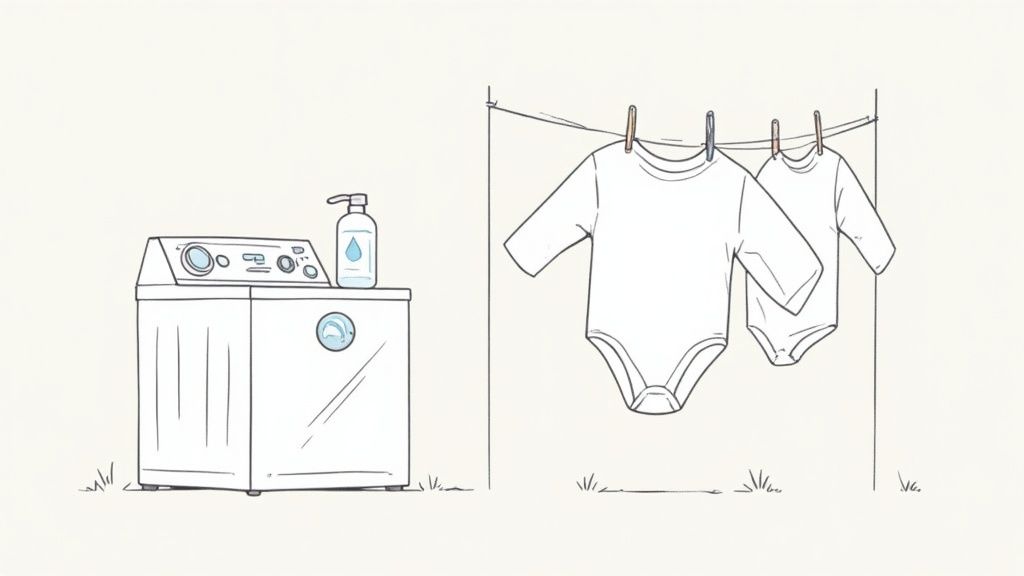
A Parent's Guide to Organic Baby Clothes Brands
Share
When you start looking for the best organic baby clothes brands, you're really looking for pure, gentle fabrics that will be kind to your little one's delicate skin. These brands focus on materials like GOTS-certified organic cotton, which is grown without nasty pesticides and processed without harsh chemicals, making it a much safer and healthier choice right from the start.
Why Organic Clothes Are a Healthier Choice for Your Baby
As a parent, your baby’s well-being is at the top of your mind, always. Choosing organic clothing is one of those loving, practical decisions that goes way beyond just being a trend. It really comes down to what is touching your baby's super delicate and highly absorbent skin all day, every day.
Think about it: conventional fabrics, like the standard cotton you see everywhere, are often grown with a shocking amount of pesticides and synthetic fertilizers. Even after washing, traces of these chemicals can linger in the final garment. On top of that, the manufacturing process for non-organic clothing often involves harsh chemicals, toxic dyes, and even finishing agents like formaldehyde to keep clothes from wrinkling.
For a baby, whose skin is up to five times thinner than an adult's, this constant exposure can easily lead to skin irritation, rashes, or flare-ups of conditions like eczema. It's the difference between serving a meal full of unknown additives and one that's pure and wholesome.
The Gentle Touch of Pure Fabrics
Organic baby clothes offer a simple, beautiful alternative. Brands that are truly committed to organic practices start with fibers grown in clean, healthy soil. That means no synthetic pesticides, no genetically modified seeds, and a production process that skips all the harsh stuff.
Think of it as a protective barrier. By choosing organic, you're helping to minimize your baby's "chemical load" from day one, wrapping them in nothing but pure, breathable softness. It's a simple switch that brings so much peace of mind and real, tangible comfort.
This infographic does a great job of showing the journey of organic cotton—from a clean farm all the way to a happy, cozy baby in a soft onesie.

You can see how every single step in the organic process is designed to protect both the planet and your baby’s sensitive skin. It’s a win-win.
Beyond the Fabric: A Commitment to Health
The benefits of dressing your baby in organic materials don't stop at just avoiding skin irritants. These fabrics are often much softer and more durable, and their natural breathability is fantastic for helping regulate your baby’s body temperature. This means they stay comfortable whether they're napping or enjoying some tummy time.
You can learn more by exploring the world of chemical-free baby products and seeing how they all work together for a healthier start in life. At the end of the day, choosing organic clothing isn't just about a label; it’s a practical, reassuring choice for a healthier, happier baby.
Decoding the Labels on Organic Baby Clothes
When you first start shopping for organic baby clothes, looking at the tags can feel like trying to decipher a foreign language. You see all these different logos and acronyms, but what do they really mean for your little one? Let's break it down.
Learning to read these labels is the best way to see past clever marketing and find brands that are truly committed to making safe, high-quality clothes.
Think of these certifications like a "USDA Organic" seal on your groceries. It’s an independent, third-party guarantee that the fabric touching your baby’s skin is pure, safe, and made the right way. And it's clear that parents are catching on.
The global market for organic baby clothes was valued at a whopping USD 2.02 billion and is expected to climb to USD 3.39 billion by 2032. This isn't just a fleeting trend; it’s a massive shift in how we think about the products we buy for our kids. You can dive deeper into this trend with the full market analysis on Maximizemarketresearch.com.
So, what are the most important labels to look for? Here’s a quick rundown of the big ones.
Key Organic Clothing Certifications at a Glance
Navigating the world of eco-friendly and non-toxic certifications can be confusing. This simple table breaks down the most common labels you'll see on tags, helping you quickly understand what each one promises for your baby's clothes.
| Certification | What It Guarantees | Primary Focus |
|---|---|---|
| GOTS | At least 95% organic fibers, no toxic chemicals used in processing, and fair labor practices. | The entire production chain, from farm to finished garment (eco-friendly and social responsibility). |
| OEKO-TEX® STANDARD 100 | Every part of the garment is free from over 350 harmful substances. | Safety of the final product and its direct contact with skin (human health). |
| USDA Organic | Primarily for raw fibers (like cotton) grown without synthetic pesticides or fertilizers. | The agricultural (farming) stage of the fiber. |
While each certification has its own unique focus, seeing GOTS or OEKO-TEX® (or both!) is a fantastic sign that you're looking at a high-quality, safe product from a brand that cares.
GOTS: The Gold Standard for Organic
If you see a GOTS (Global Organic Textile Standard) logo, you’ve hit the jackpot. This is widely considered the most comprehensive, top-tier certification out there for organic textiles.
It’s an all-in-one promise that covers the entire journey of the garment, from the moment the seed is planted to the final stitch on that little onesie.
A GOTS-certified product means:
- The fabric is made from at least 95% certified organic fibers.
- No nasty chemicals, like toxic heavy metals or formaldehyde, were used at any point.
- The people who made the clothes were treated fairly, with safe working conditions and fair wages.
Basically, GOTS ensures the clothing is good for your baby, good for the planet, and good for the people who made it. It’s the whole package.
OEKO-TEX®: A Promise of Safety
Another label you’ll see everywhere is OEKO-TEX® STANDARD 100. Think of this one as a laser-focused safety check. While GOTS looks at the big picture of being organic and ethical, OEKO-TEX® zooms in on one thing: making sure the final product is completely safe for human health.
This label confirms that every single component of the garment—from the thread and buttons to the fabric itself—has been tested and found free from a list of over 350 harmful substances. It's your peace-of-mind guarantee that nothing on that piece of clothing will irritate your baby’s sensitive skin.
It’s worth noting that a product can be OEKO-TEX® certified without being made from organic materials. However, the best brands don't make you choose. At Little Venture Co., our bamboo pajamas carry both GOTS and OEKO-TEX® certifications to offer the highest possible level of trust.
You can learn more about this crucial safety standard in our in-depth guide to what OEKO-TEX® Standard 100 is. By keeping an eye out for these key labels, you can shop with confidence, knowing you're making the safest and most thoughtful choice for your baby.
The Best Organic Fabrics for Your Baby's Sensitive Skin

Let's be honest, not all fabrics are created equal—especially when you’re talking about that brand-new, delicate baby skin. The right material can be the secret to a happy, comfy baby versus an afternoon of mysterious fussing. It's a huge piece of the puzzle when you're looking for the best organic baby clothes brands.
So, let's dive into the two fabrics that really shine in the world of baby clothes: GOTS-certified organic cotton and bamboo viscose.
GOTS-Certified Organic Cotton: The All-Around Champion
Think of GOTS-certified organic cotton as that reliable, best-friend of your baby's wardrobe. There's a reason it's so popular. It’s unbelievably soft, breathes beautifully, and is tough enough to handle whatever life (and your washing machine) throws at it.
The natural fibers let air move freely, which is key to keeping your little one from getting too hot and helps sidestep pesky skin irritation. It’s a true all-season workhorse, perfect for everything from onesies for tummy time to those snuggly sleep sacks for nighttime. And that GOTS seal of approval? It's your guarantee that the fabric is pure and safe, all the way from the cotton field to the final stitch.
Bamboo Viscose: The Silky-Smooth Temperature Regulator
If organic cotton is the trusty foundation, then bamboo viscose is the luxurious, buttery-soft upgrade. This fabric has an almost silk-like feel that is just heavenly against a baby’s skin. It’s the closest you can get to wrapping your little one in a cloud.
But the incredible softness is just the beginning. Bamboo viscose has a hidden superpower: it’s a master of thermoregulation.
What that means is the fabric naturally helps keep your baby’s body temperature in that "just right" zone. It wicks moisture away to keep them cool when it's warm, but also acts as a cozy insulating layer when the temperature drops.
This amazing quality makes it an absolute game-changer for pajamas and everyday outfits, keeping your baby comfortable through naptime, playtime, and everything in between. It's no wonder so many parents swear that bamboo is one of the best fabrics for sensitive skin, especially for babies who struggle with eczema or rashes.
When you're trying to decide between them, here’s a quick breakdown:
- Organic Cotton: Your classic, go-to choice for breathable, durable, everyday softness. It's a tried-and-true favorite that always gets the job done.
- Bamboo Viscose: The top pick for silky-smooth comfort and incredible temperature control. It's especially perfect for sleepwear and for babies with extra-sensitive skin.
Both are fantastic options, but knowing what makes each one special helps you pick the perfect fabric for your baby's needs at any given moment. When you choose materials like these, you're doing more than just putting clothes on your baby—you're wrapping them in the purest, gentlest comfort possible.
How to Choose the Right Organic Baby Clothes Brands
Okay, so now you know the difference between GOTS and OEKO-TEX®, and you can spot a good fabric blend from a mile away. That’s a huge step! But how do you actually take that knowledge and pick the perfect brand for your little one?
It’s about more than just reading the tag. It’s about finding companies that get what it’s like to be a parent and whose values feel like a natural extension of your own.
The baby apparel market is absolutely booming—it's currently valued at around USD 227 billion globally. Even crazier? It's expected to soar past USD 350 billion by 2033. This massive growth is being fueled by parents just like you who are demanding safer, more sustainable options for their kids. People are waking up to how textiles affect our babies and the planet.
With this surge in demand, new organic baby clothes brands are popping up everywhere. But they aren't all cut from the same cloth. Let's break down how to spot the truly special ones.
Look for Practical and Thoughtful Design
The best organic baby clothes aren’t just made from pure materials; they’re designed for real, wiggly babies and the parents chasing after them. Life with an infant is a beautiful mess, filled with countless diaper changes at all hours. Practicality isn't a luxury—it's a lifesaver.
Keep an eye out for those little details that make your life so much easier:
- Two-way zippers. Seriously, these are a game-changer for those 3 AM diaper changes. No more fully undressing a sleepy (and probably cranky) baby.
- Well-placed snaps that stay put but don't require a wrestling match to open and close.
- Gentle elastic that doesn't pinch or leave angry red marks on that delicate, chubby skin.
- Fold-over cuffs on sleeves and pant legs. These are brilliant for preventing accidental scratches and keeping tiny toes toasty warm without needing socks.
When you see these features, you know a brand truly understands the day-to-day chaos of parenting. They've designed clothes that are both adorable and incredibly functional.
Find a Brand with a Heart
Beyond the nuts and bolts of design, you have the opportunity to support a brand that really aligns with what your family stands for. Some companies are built on something more than just profit; they weave a purpose into their products that makes every purchase feel significant.
For families of faith, finding clothing that reflects their values can bring an extra layer of joy and meaning. Brands that infuse inspiration into their designs offer more than just an outfit—they offer a sweet, gentle expression of hope and love.
Here at Little Venture Co., for instance, we match our incredibly soft, GOTS-certified organic fabrics with faith-inspired designs that celebrate the beauty of creation. We also give a portion of every sale to support Heartbeat International, an organization that helps pregnant women in need. It turns something as simple as buying a onesie into a small act of kindness.
Deciding between materials like bamboo and cotton can be tricky, but our guide comparing organic cotton vs. bamboo can help you figure out what's best for your baby. At the end of the day, the right brand is one you can trust completely—for its quality, its thoughtful design, and its mission.
Making Your Organic Baby Clothes Last Longer

You've invested in beautiful, high-quality pieces from organic baby clothes brands, which is a fantastic step for your little one's well-being. These garments are made to be wonderfully soft and surprisingly durable, but a little TLC will go a long way. With the right care, they'll stay lovely enough to be passed down to the next baby in the family or a close friend.
I like to think of these natural fibers like a delicate houseplant. They just need gentle, consistent care to really thrive—not harsh, aggressive treatments. Our goal here is simple: get them clean while protecting that buttery-soft feel and keeping the colors bright.
It really just takes a few small tweaks to your laundry routine to keep every little outfit feeling just as cozy as the day you brought it home.
Your Simple Guide to Washing Organic Garments
The real secret to keeping organic baby clothes in tip-top shape is a gentle touch. Natural fibers like organic cotton and bamboo viscose have two main enemies: harsh chemicals and high heat. These can cause the fibers to break down, shrink, or lose that signature softness we love so much.
It all starts with your detergent. Look for a mild, plant-based, or pH-neutral soap. A lot of the big-name detergents are packed with optical brighteners, heavy fragrances, and other chemicals that can easily irritate a baby's skin and strip the soft texture right out of the fabric.
Here are a few simple habits to get into on laundry day:
- Go Cold: Always, always use a cold, gentle cycle. Hot water is a recipe for shrinking natural fibers and can actually set stains, making them a permanent fixture.
- Separate and Secure: It’s a good idea to wash organic pieces with other soft items. Zippers, buttons, and rough fabrics on other clothes can cause snags. For an extra layer of protection, pop any delicate items into a mesh laundry bag.
- Pre-Treat Stains Gently: For those inevitable spit-ups and spills, dab a little of your gentle detergent or a natural stain remover on the spot before washing. Just promise me you'll steer clear of chlorine bleach—it's way too harsh and will weaken the fabric over time.
The right care routine does more than just clean; it preserves the investment you've made in your baby's comfort. Gentle washing and drying methods ensure that the fabric's structure remains intact, keeping it soft and breathable wash after wash.
Drying Tips to Prevent Shrinking and Fading
How you dry your baby's organic clothes is just as important as how you wash them. That high, intense heat from a standard dryer cycle? It's simply too much for these delicate materials.
Whenever you can, line drying is the absolute best way to go. It's incredibly gentle on the clothes, prevents shrinking, and gets a little natural sanitizing boost from the sun. If you're in a pinch and need to use a machine, just be sure to select the lowest heat setting or a tumble-dry-low option. This one tiny change can make a massive difference in how long the garments last, keeping them looking and feeling brand new.
So, What's the Takeaway Here?
When you choose organic for your little one, you're doing so much more than just buying clothes. You’re wrapping them in love, safety, and a commitment to a healthier planet. Getting familiar with certifications like GOTS means you can finally trust that what you're buying is truly pure, from the farm all the way to their closet. It's about finding those organic baby clothes brands that just get you and what your family stands for.
And you're not alone in this. This isn't just a small trend; it's a global movement. Europe is already leading the way, making up over 30% of the entire market, and places like the Asia Pacific region are catching on fast. The latest market reports show that parents everywhere are making more conscious decisions, just like you.
At the end of the day, it all comes down to peace of mind. Knowing your baby is snuggled up in something pure, safe, and made with intention? That’s a feeling you just can’t beat. You're making a beautiful choice for their first days and beyond.
Got Questions About Organic Baby Clothes? We've Got Answers.
When you start looking into organic baby clothes brands, a few questions always pop up. It's totally normal! You're just trying to make the best, most informed choice for your little one. So, let's tackle some of the most common ones together.
Is Organic Baby Clothing Really Worth It?
One hundred percent, yes. It's easy to get sticker shock at first, but think of it less as a purchase and more as an investment in your baby's well-being. Regular fabrics often carry leftover residues from pesticides and pretty harsh chemicals from the manufacturing process, which can be a real problem for a baby's delicate, super-sensitive skin.
And it's not just about what's not in the fabric. Organic pieces from good brands are just made better. They're built to last, holding up wash after wash (after wash). The value you get over time is fantastic, and these clothes often stay in such great shape they can easily be handed down when the time comes.
What’s the Real Difference Between GOTS and OEKO-TEX?
This is a great question, and it's one that trips up a lot of people. They sound similar, but they're checking for different things.
Here’s an easy way to think about it:
GOTS is all about the organic promise. It's the gold standard, looking at the entire journey of the garment—from the seed in the ground to the final product. For a GOTS label, the item must have at least 95% organic fibers and be made in an environmentally and socially responsible way.
OEKO-TEX® Standard 100 is a safety checkpoint. It tests the final product you hold in your hand—every thread, button, and zipper—to make sure it’s completely free from a long list of harmful chemicals. So, a piece of clothing can be safe (OEKO-TEX® certified) without being organic, but GOTS-certified stuff is already held to incredibly high safety standards.
Are Bamboo Baby Clothes Actually a Good Sustainable Choice?
Bamboo can be an amazing choice, but it all comes down to how it's made. The bamboo plant itself is a sustainability rockstar—it shoots up like a weed without needing pesticides or a ton of water.
The tricky part is turning that tough stalk into the buttery-soft fabric we all love. That process can involve some harsh chemicals. To make sure you're getting a truly green option, you want to find brands that use a "closed-loop" system. This just means they recycle and reuse the water and solvents, preventing them from being released into the environment. When it's done right, bamboo is one of the most beautiful and responsible choices you can make for your baby.
Here at Little Venture Co., our mission is to wrap your baby in the purest fabrics that also reflect your faith and values. That's why our designs are crafted from GOTS-certified, OEKO-TEX® approved bamboo—giving you total peace of mind with every snuggle. Come see our collection of gentle, meaningful babywear at https://littleventureco.com.
